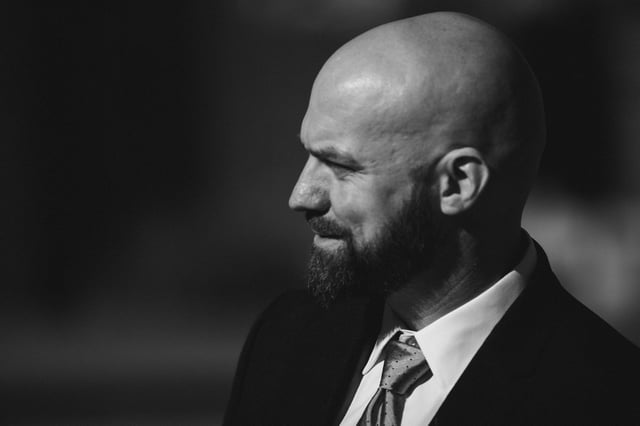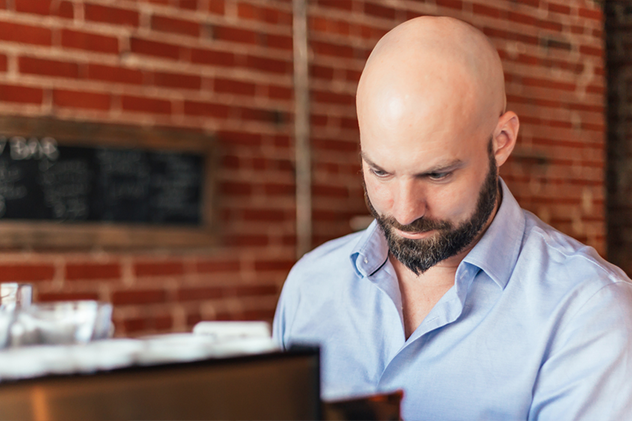Pete Licata won the World Barista Championship in 2013. Along with his former coach Holly Bastin he now runs the cafe consulting and barista training business Licata Coffee Consultants and online bean evaluation platform Roast Ratings. We caught up with Pete to find out what it takes to be the best.

To start, can you tell me a bit about your background and how you came across the World Barista Championship (WBC)?
I started working with coffee in 2003. It was initially just a part time job while I was going to college but I found that it was a lot of fun. I was working for a company called PT’s Coffee in Kansas City where I was first exposed to the WBC as the owner helped to judge and put the events together. Then during an event in Kansas City I was involved in a workshop with Tim Wendelboe who was the 2004 champion. That showed me the level of professionalism involved and got me excited and thinking – “I could do that, I’m good at making coffee.”
When did you first start competing?
I started competing in 2005 here in the US. We had regional and national championships, and I always did well. I won regional championships a number of times and I progressively got better. Then I took a year off and moved to Hawaii when a new opportunity came up, figuring I would give it up. But it brought me back in. I found that it was kind of an outlet for perfectionism. It’s a really good place to put all your energy to try to excel and be the best at something. Back then we didn’t really have a lot of resources. You couldn’t hop online and watch videos to see what they did and to understand the rules, you just had to figure it out as you went along. So it had me hooked. I found myself planning and practicing for the championship every year. Even when the competition was six months away I’d be thinking, “that’s a great idea, I should try that, this would be perfect for it.”
So what brought you back to it?
In Hawaii there is coffee growing so I got to learn a lot about origin, about the processing, how coffee is made, and how it’s made well. The company I worked for at the time wanted me to compete so in 2010 I competed again but I didn’t do as well as before, so I decided I was going to reinvent what I was doing. That was the turning point for me. I decided if I was going to compete again, I was going to do it like nobody had ever done it before. You know, I’m just going to blow everybody’s mind!
I went out to this farm and decided I was going to do it all myself. I picked all the coffee from the trees, processed it all myself, did all the sorting – the whole nine yards of everything you do with coffee, including roasting. The only thing I didn’t do was rake and dry it because I was living and working in Honolulu and I didn’t have the time to spend every day raking coffee. But I was exposed to it, I knew how it was done. I decided to essentially tell the story of that coffee for the championship that year.
"I found that it [competing] was kind of an outlet for perfectionism."
It was a big moment. I won the US Barista Championship finally that year and came second in the world. That gave me a good understanding of what it entails and how hard it is, and I discovered a lot of details you don’t get from reading a book, watching a video or talking to somebody. When you get your hands dirty and you actually do it, you get so much more intuitive knowledge with it. So that was kind of a breakout year for me but I was also burnt out, I was done. I had spent seven months going out to pick coffee, having it roasted, taking it to competition. I thought, this is too much work, I’m getting a little too deep. So I took a year off in 2012 and decided to judge instead for the first time.
Which competition did you judge?
It was for the US Barista Championship, which keeps all their rules as close to the WBC as they possibly can so it’s a pretty good translation but a little different obviously.
You know it’s funny, I went through this class that explained the judging criteria – this is what we’re looking for, this is how you do this, the protocol and the timing and what the latte art is supposed to be like, all these little things. And I’m like “that’s what you’re looking for!” I didn’t know that, I didn’t know the judging criteria. That was a big eye-opener. But I didn’t know if I wanted to compete again or judge. I thought maybe I’d coach somebody. Ultimately through conversations with different judges and competitors, I decided to give competing one more try, but this time I had a little bit of a different take on it. After the disappointment of coming second in the WBC, I realised you really have to present something that’s true to you and that you’re passionate about. Because if you’re not really excited about it, the judges can tell.
How did that realization impact your preparations for the WBC in 2013?
What I realised was that in 2011 I had something that was really special, but it was all about me, it was very egocentric. And while it’s not necessarily a bad thing to be confident and sure of yourself, when you’re talking about an industry that’s as broad as the coffee industry is, and you only give yourself credit for the coffee, you’re not representing the entire industry. So my perspective changed, and I wanted to show that while I did produce the coffee myself, and know all these things about the origin, the processing and the flavors, on a day to day basis we have to rely on other people. We have to rely on producers, farmers, roasters and everybody in between who is responsible for the coffee from seed to cup – everybody has their effect on it. That’s when I decided to present how much each person impacts the coffee and how important their role is, rather than presenting a "look what I did" version.
"...you really have to present something that’s true to you and that you’re passionate about."
You have to make great coffee if you want to do well. But professionalism, the explanation of the signature drink, and the overall impression you make is used by the judges as a guide to figure out how knowledgeable you are about the industry as a whole beyond the drinks you serve in the competition. There were a lot of layers to my presentation. I talked about the coffee industry but there were also subtle themes going on that I was showing through what I was presenting. They couldn’t deny my knowledge and my understanding of the industry.
So what are you up to at the moment?
I have a consulting business right now, that I run with my longtime friend and old coach from the WBC. We do a lot of barista and roast training, as well as competition training. We coached Hidenori Izaki in 2014 when he won the WBC, as well finalist Craig Simon.
But we also work with cafes on drinks and menu development. I do a lot of appearances, presentations and speeches around the world. We also started a new business called Roast Ratings, which is a viewing and rating system for roasted coffee. It’s consumer focused, for people who are not coffee professionals. We also write a lot of articles and blog posts on there. We’re working on implementing espresso for other markets, because everything here in America is filter. We have a lot of fun with that one, it’s a cool project.

It seems that coffee selection for competitions is a big part of your consultancy business. What is the process of selecting those particular coffees?
There are a few processes we can go through. It really depends on what the barista is trying to do. I love when people want to go to origin and really seek out or work with the farmer to create a new coffee. It’s a pretty common thing in the barista championships now. Which is cool, it can definitely bring out new flavours, but it’s not always 100% necessary depending on what you’re doing.
"...being intimately knowledgeable about the particular coffee that you’re using is really useful..."
You need distinct, articulate flavours in your coffee and it needs to be clean and smooth. I like people to have some origin experience because being intimately knowledgeable about the particular coffee that you’re using is really useful for the WBC. Because you’re trying to showcase your knowledge about the coffee, not just your skills as a great barista. So we want people to select something they connect with. Obviously it depends on the barista and what they’re trying to do, but it really boils down to getting a combination of the best cup of coffee, with the storytelling element of what it is that makes that coffee special.
If you had to put it down to own thing, what is something you wish every coffee professional knew about coffee?
I think the one thing that sticks out the most is patience. Patience is a very under-valued resource for a coffee professional. And it doesn’t matter that you don’t know something, what matters is that you learn it, and it takes time. You can’t ever master something until you’ve done it enough times. The longer you do something, the better you get at it. And the more natural it becomes. So I always tell people, take the time. Don’t be angry that you’re not at the place you want to be, keep your goal in sight and know that you want to get there.
And as a bit of a side note, another thing I’ve learned is that there is very little you can’t do if you put your mind to it. It’s a matter of trying and not being afraid to fail. That’s part of the experience. If you fail, you fail, but you learn from it. You have to figure out how to get better and what it's going to take to make you great. Instead of just assuming you’re great!